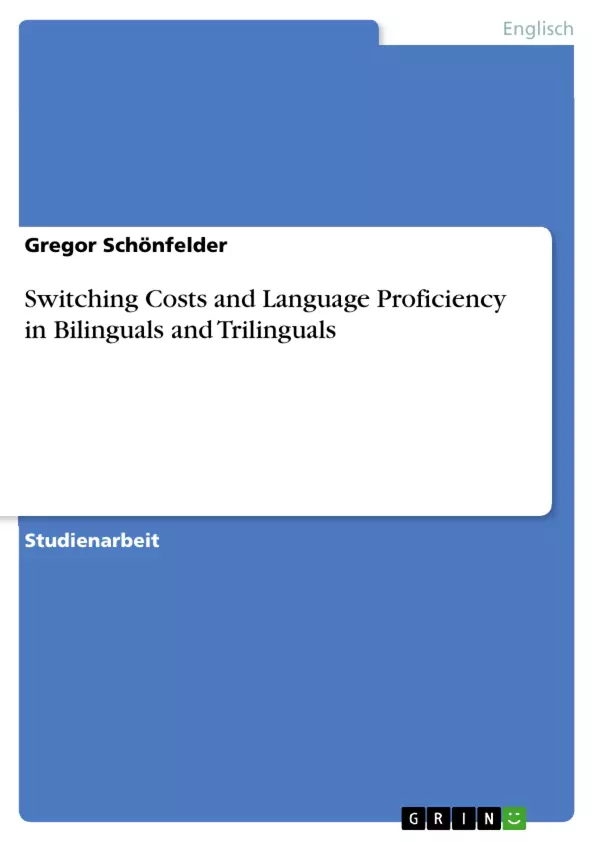As our world becomes more and more globalised, the number of people who speak more than two languages increases, thus making research into trilingualism an attractive enterprise in order to see what the effects of three languages in one mind might be. In recent years, there has been an increase in studies investigating, amongst other aspects, cross-linguistic influences on third language acquisition or word recognition in trilinguals. However, in general, such research is still relatively scant. Trilingualism is often seen as merely a special case of bilingualism and most of the findings for bilingualism have been regarded as extendable to trilingualism, often not even making a distinction between bilingualism, trilingualism, and multilingualism in general. Some studies have tried to determine whether trilinguals have special competences that bilinguals have not, yet without conclusive results. Yet, it would be very interesting to know whether or not trilingualism is really just ‘bilingualism plus one’, i.e., the findings regarding lexical access for bilinguals extend to trilinguals.
This paper will investigate whether the findings for switching costs for bilinguals’ two languages extend to trilingualism, and to what extent these costs are influenced by language proficiency. In a first step, some general concepts and methods relevant for the papers discussed here will be reviewed. In chapter 2, two studies dealing with the issue of switching costs in bilinguals and trilinguals, respectively, will be presented and compared. In the final chapter, I will try to answer my research questions, but also to touch on alternative accounts for the findings presented here.
Inhaltsverzeichnis (Table of Contents)
- 1 Introduction
- 1.1 General Introduction
- 1.2 Key Concepts and Methods: Inhibitory Control and Stroop Test
- 2 Analysis of Data
- 2.1 Meuter et al. (1999): Bilingual Language Switching in Naming: Asymmetrical Costs of Language Selection
- 2.1.1 Assumptions and Predictions
- 2.1.2 Participants, Materials, and Procedure
- 2.1.3 Results and Main Findings
- 2.2 Marian et al. (2012): Multilingual Stroop performance: Effects of trilingualism and proficiency on inhibitory control
- 2.2.1 Assumptions and Predictions
- 2.2.2 Participants, Materials, and Procedure
- 2.2.3 Results and Main Findings
- 2.3 Comparative Analysis of Both Studies
- 3 Conclusion
Zielsetzung und Themenschwerpunkte (Objectives and Key Themes)
Diese Arbeit befasst sich mit der Frage, wie sich die Sprachkompetenz in bilingualen und trilingualen Personen auf die Geschwindigkeit und Genauigkeit des Sprachwechsels auswirkt. Dabei werden die Ergebnisse zweier Studien analysiert, die unterschiedliche Ansätze zur Untersuchung des Sprachwechsels verwenden.
- Die Auswirkungen von Sprachwechselkosten auf die Sprachproduktion
- Die Rolle des Inhibitorischen Kontrollmodells bei der Sprachsteuerung
- Die Bedeutung der Sprachkompetenz für die Sprachwechselsituationen
- Der Vergleich von bilingualen und trilingualen Sprachkompetenzen
Zusammenfassung der Kapitel (Chapter Summaries)
Kapitel 1 bietet eine allgemeine Einführung in die Thematik des Sprachwechsels und die Untersuchung der Inhibition bei Mehrsprachigen. Es werden zentrale Konzepte wie das Inhibitorische Kontrollmodell und der Stroop-Test vorgestellt. Kapitel 2 analysiert zwei relevante Studien: Meuter et al. (1999) untersucht den Sprachwechsel in bilingualen Personen, während Marian et al. (2012) die Auswirkungen von Trilingualismus und Sprachkompetenz auf die Inhibition im Stroop-Test analysieren.
Schlüsselwörter (Keywords)
Die Arbeit beschäftigt sich mit dem Thema des Sprachwechsels in bilingualen und trilingualen Personen, wobei der Fokus auf dem Inhibitorischen Kontrollmodell, dem Stroop-Test, der Sprachkompetenz, den Sprachwechselkosten und der lexikalischen Auswahl liegt. Darüber hinaus werden die Ergebnisse der beiden Studien von Meuter et al. (1999) und Marian et al. (2012) verglichen und in Bezug auf die Frage nach der Rolle der Sprachkompetenz im Sprachwechselprozess analysiert.
Häufig gestellte Fragen
Was versteht man unter Sprachwechselkosten (Switching Costs)?
Dies sind Verzögerungen in der Reaktionszeit oder Einbußen in der Genauigkeit, die auftreten, wenn eine mehrsprachige Person von einer Sprache in eine andere wechselt.
Welche Rolle spielt die Sprachkompetenz (Proficiency) beim Sprachwechsel?
Die Kompetenz beeinflusst die Stärke der Inhibition. Oft zeigen weniger kompetente Sprecher asymmetrische Kosten, da die dominante Sprache stärker unterdrückt werden muss.
Was ist das Inhibitorische Kontrollmodell?
Es ist ein theoretisches Modell, das erklärt, wie das Gehirn die aktuell nicht benötigte Sprache unterdrückt (inhibiert), um die Produktion in der Zielsprache zu ermöglichen.
Wie wird die Inhibition bei Mehrsprachigen getestet?
Ein häufig genutztes Verfahren ist der Stroop-Test, der die Fähigkeit misst, störende Informationen zu unterdrücken und sich auf relevante Reize zu konzentrieren.
Gibt es Unterschiede zwischen bilingualen und trilingualen Sprechern?
Die Forschung untersucht, ob Trilingualismus lediglich „Bilingualismus plus eins“ ist oder ob trilinguale Personen über zusätzliche kognitive Kompetenzen bei der Sprachsteuerung verfügen.
- Quote paper
- Gregor Schönfelder (Author), 2013, Switching Costs and Language Proficiency in Bilinguals and Trilinguals, Munich, GRIN Verlag, https://www.grin.com/document/353270



